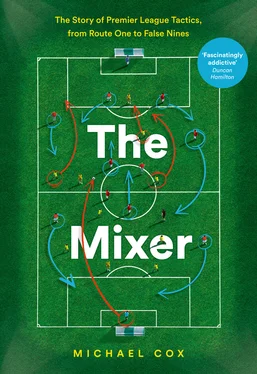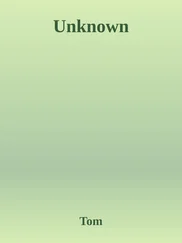While supporters quickly realised the benefit of the back-pass change, many players found themselves exposed. The impact was first noticed in pre-season, when Manchester City goalkeeper Andy Dibble suffered a broken leg in a friendly against a League of Ireland XI, struck by sudden indecision as a slow back-pass approached, eventually attempting to tackle the opposition striker. ‘I wasn’t sure whether to kick the ball or pick it up,’ Dibble complained, describing himself as ‘the first victim’ of the law. However, defenders struggled more than keepers, and the Premier League’s opening day, 15 August 1992, was a comedy of errors.
Fourteen minutes into Leeds’s 2–1 victory over Wimbledon, Dons right-back Roger Joseph panicked inside his own penalty box, caught in two minds – should he pass back to goalkeeper Hans Segers or simply clear the ball? Eventually he did neither, scuffing the ball barely two yards, allowing Leeds’s Lee Chapman to pounce – and presumably leaving Leeds manager Wilkinson unsure whether he should celebrate or ruefully shake his head at the ‘reality as stipulated by the overlords of the world game’. Down at Highbury, Norwich recovered from 2–0 down to defeat Arsenal 4–2, a victory secured with a classic example of back-pass confusion. Norwich launched a high pass into the opposition half, forcing Arsenal captain Tony Adams to deal with a bouncing ball. He nervously glanced back to his goalkeeper, realised David Seaman didn’t want the ball, so instead attempted a square pass to centre-back partner Steve Bould. But Adams missed the ball completely and stumbled, allowing Mark Robins to steal in and chip Seaman, scoring the goal that ensured Norwich were the Premier League’s first-ever leaders.
Both goals in Chelsea’s 1–1 draw with Oldham at Stamford Bridge were related to the back-pass law: Oldham centre-back Ian Marshall, troubled by his inability to play the ball back to his keeper, slipped when attempting to control a long ball and allowed Mick Harford to open the scoring. But then Chelsea goalkeeper Dave Beasant, having received the ball from a defender, scuffed his kick, allowing Nick Henry to equalise. The new rules were causing chaos.
There was also a ‘positive’ goal scored from the back-pass rule, however. Sheffield United’s Brian Deane had headed the Premier League’s opening goal against Manchester United, then scored another from the penalty spot. This second arose because Blades midfielder John Gannon looked set to play a back-pass, saw an opponent making a run to intercept his potential pass (although he wasn’t quite a ‘goalie-blocker’) and so turned his way out of danger before playing a left-footed pass into the channel. Striker Alan Cork raced onto it, was tripped by Gary Pallister, and Deane converted the penalty. There were just seven seconds from Gannon’s turn until the penalty award – without the new law, the ball would still have been in the goalkeeper’s hands at the opposite end.
Compilers of ‘football’s funniest gaffes’ VHS tapes must have been delighted. The most comical error came in early September at Tottenham, and resulted in the dismissal of Sheffield United goalkeeper Simon Tracey. He’d already been booked for handling the ball outside the box, and then, when presented with a back-pass in the second half, panicked. He was closed down quickly by Spurs’ Paul Allen, and proceeded to dribble the ball sideways, taking it directly out of play for a Tottenham throw. When Tracey tried to retrieve the ball from next to the advertising hoardings to prevent Spurs taking the throw, a quick-thinking ball boy snatched it away, chucked it to Spurs sub Andy Gray, which prompted Tracey to rugby-tackle Gray to the floor. He was dismissed. Blades manager Dave Bassett wasn’t impressed. ‘He’s got the brains of a rocking-horse – and I told him so.’
This was not simply an English phenomenon, of course, and there were similar problems across Europe. North of the border, Rangers opened the scoring in October’s Scottish League Cup Final when Aberdeen goalkeeper Theo Snelders bizarrely chested a wayward clearance from a teammate straight into the path of a grateful Stuart McCall. It wasn’t an intentional back-pass anyway, and wouldn’t have been penalised, but Snelders was clearly unaware of the regulations and was left screaming at his defenders, ‘I can’t pick it up!’ The biggest impact came in Italy. Serie A was traditionally Europe’s most defensive division, and following goals-per-game averages of 2.11, 2.24, 2.29 and 2.27 in the four seasons before 1992/93 it suddenly jumped to 2.80, an unprecedented rise. The Premier League didn’t witness such a surge, rising from 2.52 in the final old First Division season to 2.65 in the opening Premier League campaign, but the back-pass law clearly affected the nature of the division, with certain teams particularly struggling.
The most famous victims were Liverpool. Many have linked their inability to win a Premier League title, having dominated the 1970s and 1980s, to the introduction of the back-pass law. In reality they finished sixth in both the final First Division season and the first Premier League season, but Liverpool’s players admit it affected them badly. ‘It was constantly in your mind as a defender – you can’t play the ball back,’ remembered defender Nick Tanner. ‘Previously, Liverpool would just kill the game off. We’d be 1–0 up, play the ball back to Bruce Grobbelaar. He’d bounce the ball a bit, Phil Neal would drop off, and Bruce would roll it out to him. That all stopped.’ Their manager during this period was Souness – the man responsible for the back-pass to end all back-passes.
Arsenal also suffered. They were the bookmakers’ title favourites, having scored the most goals in the top flight during 1991/92, but they struggled to build play from deep and scored the fewest goals during 1992/93, underlining the extent of the back-pass change. However, they adapted well defensively and remained an excellent side in knockout competitions, winning the League Cup and FA Cup – both, coincidentally, with 2–1 victories over Sheffield Wednesday.
But the biggest losers, significantly, were a very direct side – Wilkinson’s Leeds. Having triumphed the previous season, they slipped backwards alarmingly and finished 17th in the Premier League’s inaugural campaign, failing to win away all season. Considering that Wilkinson predicted route one football would prosper under the new regulations, it was ironic that his own players suffered precisely because they could no longer play that way. Goalkeeper John Lukic became the first Premier League goalkeeper to be penalised for handling a back-pass, from centre-back Chris Whyte – whom Wilkinson had rated as the division’s best centre-back in the previous campaign but who struggled considerably with modern football. ‘The back-pass law affected us particularly,’ midfielder Gary Speed later admitted. ‘The centre-backs used to stroke the ball back to the goalkeeper, and John Lukic used to launch it up to me and Lee Chapman. Suddenly we weren’t allowed to play that way anymore.’
Fellow midfielder Steve Hodge agreed. ‘Previously John Lukic would hold the ball and he’d launch it to us high up the pitch,’ he explained. ‘Now, Lukic would have to launch it from the floor and the ball wasn’t going far enough down the pitch. We were much less of a threat because the ball wasn’t landing or being flicked to the edge of our opponents’ area, it was bobbling around in the midfield. Also, teams would now really push up and made Lukic kick it quickly.’ It’s notable how much emphasis was placed upon the simple concept of how far the goalkeeper could kick, indicating the accepted method of distribution at the time.
Nottingham Forest also paid a heavy price for the new regulations, finishing bottom. Legendary manager Brian Clough had other problems by this stage, particularly his alcoholism, which, as he later admitted, clouded his judgement significantly. But his side’s style of football didn’t suit modern football, as Gary Bannister outlined. ‘Where we’ve suffered is when we’ve had the ball, we’ve played it back to Mark Crossley and he has cleared it,’ he said. ‘On most occasions the ball has come straight back at us, putting us under pressure. Mark having to hump the ball up the field has not helped us at all. Last season, a back-pass would have kept us possession and Stuart Pearce, Brian Laws or Gary Charles would have picked the ball up from the keeper to start us off again.’
Читать дальше












